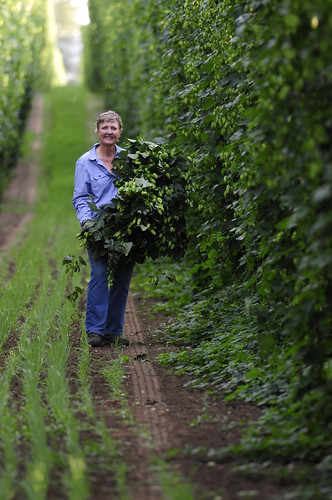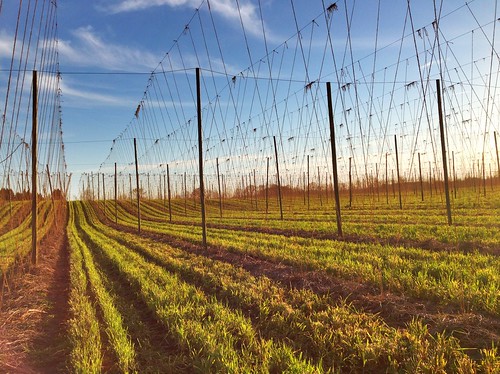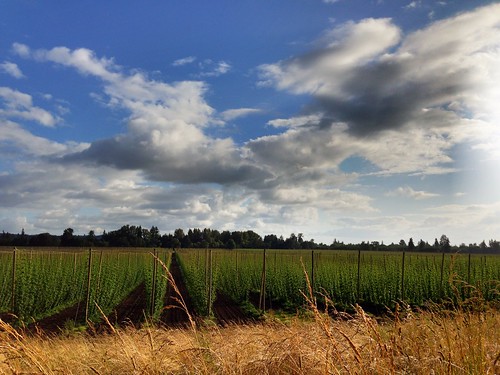
Gayle Goschie, a third generation Oregon farmer at Goschie Farms, Inc., stands in a hop yard at her farm in Silverton, Oregon. Goschie Farms was the first hop farm to be certified as Salmon-Safe, recognized for adopting practices that protect water quality and native salmon.
As part of our ongoing #womeninag series, we are highlighting a different leading woman in agriculture each month. This month, we profile Gayle Goschie, a third-generation hop grower on a farm her family has owned in Silverton, Oregon, for 130 years. Goschie Farms grows 550 acres of hops and sells to some of the nation’s top breweries. The farm also grows 150 acres of wine grapes that are sold to regional wineries and 300+ acres of other crops including grass seed, corn and wheat.
Gayle was the first woman hop grower to be awarded the International Order of the Hop in 2009, the highest honor in the International hop community and an award which her father also received in 1984. We talked about her love for the outdoors, including the beautiful hikes she takes in the Willamette Valley. She strongly believes in our responsibility to conserve and improve our lands not only as good business sense but critical to building future farm leaders.
How do you start your day?
In the months of the growing season, most of my days will start in the farm fields and vineyards with an invigorating trudge in rubber boots and raingear for the months of April, May and June, and then transitioning to a refreshing early morning hike for July, August and September. My morning routine sets my workday and it continuously adjusts to the farm’s work schedule.
Morning is my favorite part of the day – always, no matter the season.

The view from the hop yard at Goschie Farms, Inc. in Silverton, Oregon.
What is your favorite part about being a hop farmer?
I love working with and reacting to Mother Nature. There will be a seasonal plan of farm work in place, but it almost always changes from year to year, month to month and day to day. The more I experience those changes, the more I appreciate them.
I think you need a good dose of curiosity to be a farmer. It’s far better to be challenged by the work than to be overwhelmed, and we all know how overwhelming it can be because farming is hard work. But it’s boots on the ground, hands in the dirt, good honest work.
Why is conservation so important to your operation?
Conserving our natural resources is our lifeblood. It’s allowed us to farm on the same ground for over a hundred years. And it’s a natural part of our business culture to not just conserve but to improve. We do it as a farming family certainly as a way of guiding our business, but more importantly we do it out of respect for prior generations and the good fortune of passing on opportunities to the farm’s future leaders.
Who are your role models in agriculture?
I would say my role models are various and many. Certainly my foundation has been built on the values and temperaments of my parents and grandparents. I was fortunate to have a family that taught me the value of honesty and the satisfaction of a job well done.
In Oregon, we have the most fabulous role model for women in agriculture–Katy Coba, State of Oregon Director of Agriculture. Katy continues to serve the diverse ag industry of our state through multiple administrations of state leadership. And then I look to mentors outside of ag, women and men of all professions and walks of life that give me bits and pieces of inspiration and reasons for further thought. I find I’m redefining my role with every year or new challenge that comes with living and farming in this fascinating and invigorating time.
What are you watching, reading or listening to?
My last two books were connected by subject and coincidence—The Martian and An Astronaut’s Guide to Life on Earth. The Martian is a, humorous at times, look into problem solving from the remoteness of space. With every action that takes place, there’s a consequence or reaction, which I believe is much like farming. How do I accomplish solving a pest imbalance without having a counteraction that creates another problem?
An Astronaut’s Guide to Life on Earth was recommended by a high school classmate (of 40 plus years) who is an active NASA astronaut, Dr. Don Pettit. If you want to take yourself off the farm and see a very realistic look at life in the space program here’s another great escape.
How do you spend the free time you have?
Did I mention I love the outdoors? I’ve come late to, but fallen deeply for, hiking the great trails of Oregon and Washington, and a few in other parts of the world. It’s a wonderful escape to meet up with ‘city folk’ from all ages and professions as we physically push ourselves up and down trails in all types of weather and all for the fun and beauty of it. When we are training intensely it’s usually with a goal of climbing a mountain. It gives me true inspiration and a tremendous sense of place to look out across our farmland and see the various peaks in the distance where I’ve stood on the top.
In seven words or less, what is some advice you would offer your fellow women in agriculture?
Acknowledge your profession and your legacy.
From farmers and scientists to policy makers and communicators, women are at the forefront of agriculture. Check out previous Conversations with #womeninag with Anne Alonzo, Administrator of USDA’s Agricultural Marketing Service; cattlewoman Minnie Lou Bradley of Bradley 3 Ranch; National Young Farmers Coalition founder Lindsay Lusher Shute; Dean of the College of Agriculture at Virginia State University Dr. Jewel Hairston; founder and editor-in-chief of Civil Eats Naomi Starkman; Oregon Rancher and county committee member Cory Carman; and Executive Director of the Flint River Soil and Water Conservation District Casey Cox. You can continue to follow our conversation with #womeninag on Storify.
Is there a leading woman in agriculture you would like to hear from? Send us your suggestions using #womeninag or via email at agwomenlead@usda.gov.

Hop production is underway at Goschie Farms, Inc. in Silverton, Oregon.
No comments:
Post a Comment